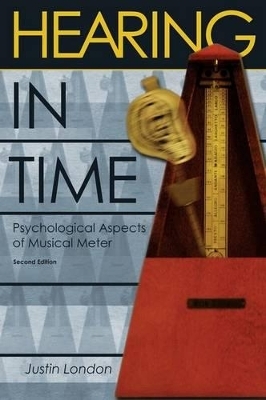
Hearing in Time
Oxford University Press Inc (Verlag)
978-0-19-974437-4 (ISBN)
Our sense that a waltz is "in three" or a blues song is "in four with a shuffle" comes from our sense of musical meter. Hearing in Time explores the metric aspect of our musical experience from a psychological point of view. Musical meter is taken as a musically-specific instance entrainment, that is, our more general ability to synchronize our actions to the rhythms around us. As such, musical meter is subject to a number of fundamental perceptual and cognitive constraints. These constraints are the cornerstones of Hearing in Time's account of musical meter. Hearing in Time also takes into account the fact that listening to music, like many other rhythmic activities, is something that we do a lot. It also approaches musical meter in the context of music as it is actually performed, with nuances of timing and dynamics, rather than as a theoretical ideal.
Hearing in Time's approach to meter is not based on any particular musical style or cultural practice, and so it discusses musical examples from a wide range of musical styles and cultures--from Beethoven and Bach to Brubeck and Ghanaian (Ewe) drumming. In taking this broad approach a number of fundamental similarities between a variety of different metric phenomena--such as the difference between so-called simple versus complex or additive meters--become apparent.
Hearing in Time is written for musicians, musicologists, music theorists and psychologists who are interested in rhythm and meter. Only a modest ability read a musical score is presumed, and most musical examples are taken from familiar popular and classical repertory.
Justin London is Professor of Music at Carleton College. He is the author of Hearing in Time (OUP 2004) as well as several articles in the recent revision of The New Grove Dictionary of Music and The Cambridge History of Western Music Theory. He served as President of the Society for Music Theory in 2007-2009.
Table of Contents ; Introduction ; Meter as a Kind of Attentional Behavior ; Relevant research on Rhythmic Perception and Production ; The Neurobiology and Development of Rhythm ; Meter-Rhythm Interactions I: Ground Rules ; Metric Representations and Metric Well-Formedness ; Meter-Rhythm Interactions II: Problems ; Metric Flux in Beethoven's Fifth ; Non-Isochronous Meters ; NI-Meters in Theory and Practice ; The Many Meters Hypothesis ; Conclusion ; Notes ; Bibliography ; Index
| Erscheint lt. Verlag | 7.6.2012 |
|---|---|
| Verlagsort | New York |
| Sprache | englisch |
| Maße | 155 x 231 mm |
| Gewicht | 340 g |
| Themenwelt | Kunst / Musik / Theater ► Musik ► Musiktheorie / Musiklehre |
| Geisteswissenschaften ► Psychologie ► Allgemeine Psychologie | |
| Geisteswissenschaften ► Psychologie ► Test in der Psychologie | |
| Geisteswissenschaften ► Psychologie ► Verhaltenstherapie | |
| ISBN-10 | 0-19-974437-8 / 0199744378 |
| ISBN-13 | 978-0-19-974437-4 / 9780199744374 |
| Zustand | Neuware |
| Informationen gemäß Produktsicherheitsverordnung (GPSR) | |
| Haben Sie eine Frage zum Produkt? |
aus dem Bereich


